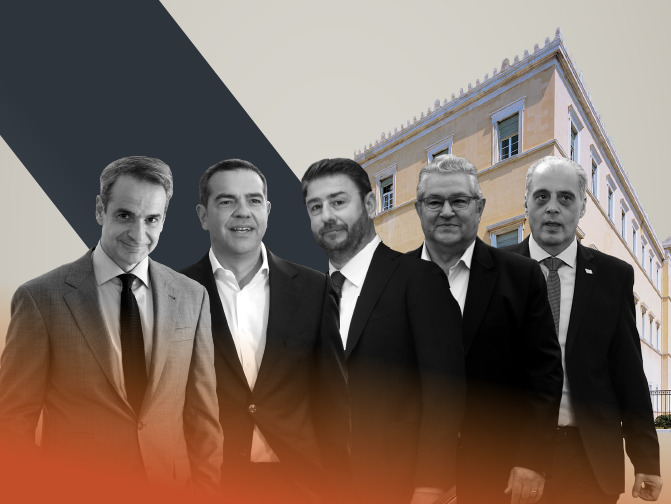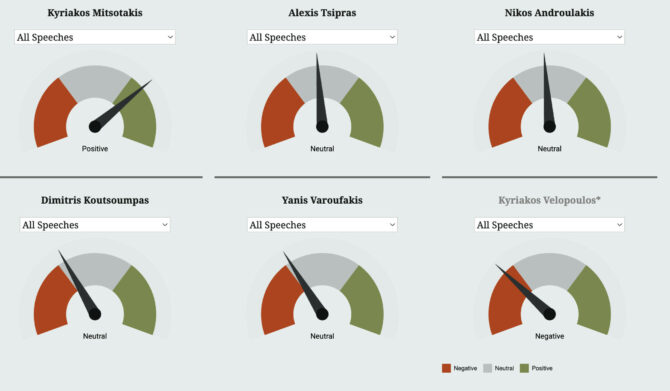How did political leaders address the issue of migration and refugees, if they addressed it at all, during the extended election period prior to the tragic shipwreck off the coast of Pylos?
The devastating sinking of a fishing boat carrying hundreds of refugees and migrants off Pylos on Wednesday, June 14, 2023, brought the issue of migration and refugees to the forefront of public debate. While this is an internationally recognized key issue of our time, it did not receive significant attention from political leaders during the lengthy election period in the country.
Based on the data we collected for our research on political discourse during the election campaign (encompassing the period leading up to the May 21 elections and the subsequent June 25 elections) indicates that, until the aforementioned tragedy occurred, the issue of migration was either completely absent from the agenda of political leaders or received only passing mentions in their speeches. Of particular interest is how the issue was framed and the connotations associated with it.
Indeed, a strikingly contrasting picture emerges when examining the election speeches of the leaders of the two largest parties, New Democracy and SYRIZA.
Sentiment analysis in the political discourse regarding immigration and national security, by political leader and speech during the second election period
Note: The negative or positive sentiment may be connected to the criticism towards political opponents or the agenda presented by the political leader on the topic of reference in each speech.
Sentiment analysis in the political discourse regarding immigration and national security, by political leader and speech during the first election period
Note: The negative or positive sentiment may be connected to the criticism towards political opponents or the agenda presented by the political leader on the topic of reference in each speech.
The political discourse in the middle of the new election period

The decrease of the polarization and populist discourse patterns decrease and the issues that political leaders raise either as programmatic cutting-edge positions or as part of criticism towards their political opponents.
Border protection and the Evros fence: Kyriakos Mitsotakis’ approach to the migration issue during the election campaign
Although immigration is not a central theme of Kyriakos Mitsotakis’ campaign speeches, he references it more frequently than any other political leader. In nearly half of his speeches during the first election campaign, there is at least one mention or passing reference to the immigration issue. These references continue to appear in the current election period, both before and after the shipwreck near Pylos. However, it cannot be claimed that immigration is a top priority on Kyriakos Mitsotakis’ agenda, as an overall analysis of his election speeches reveals that immigration constitutes only 2% of his programmatic discourse as the President of New Democracy. Thus, while references to immigration are regularly made, they are brief mentions and do not constitute a systematic discussion within the context of pre-election political discourse.
These references primarily emphasize a specific aspect: the protection of borders and the Evros fence as symbols of this policy. Kyriakos Mitsotakis’ overall approach to migration in his election speeches revolves around this perspective. Immigration is often presented as primarily an issue of national security, frequently connected to other national security concerns, such as military armaments – It should be noted here that the topic of national security constitutes 5% of Kyriakos Mitsotakis’ programmatic discourse during both the first and second election periods, according to the overall analysis of his speeches. The leader of New Democracy strongly criticizes SYRIZA’s past actions on the migration issue, using words such as “hellhole” or “labor camp” to describe the Moria refugee camp.
Kyriakos Mitsotakis addresses the recent tragic shipwreck and the migration issue in both of his speeches following the resumption of election activities. It is worth noting that the political leaders had suspended their election speeches during the national mourning declared in response to the shipwreck. In these speeches, Mitsotakis defends the “different policy” implemented by his government, characterizing it as “fair and strict.” According to him, this policy aimed to protect the borders, alleviate the islands from camps that housed thousands of residents, and ultimately save lives. The key programmatic message he conveys in his recent speeches is the commitment to continue the border control policy and complete the construction of the Evros fence.
The issue of migration is completely absent from Alexis Tsipras’ election discourse
Alexis Tsipras’ election discourse completely overlooks the topic of immigration. This observation was previously highlighted during the review of the initial election campaign. The only instance where Tsipras touches upon the issue is during a speech in Alexandroupoli, where he mocks Kyriakos Mitsotakis and other officials for posing in front of the Evros fence. In that same speech, Tsipras disapproves of what he sees as an attempt to create a distinction between the government, which supposedly has a strong national spirit, and the opposition, which is portrayed as lacking in national spirit.
However, the issue of immigration has become a point of differentiation – and at times polarization – between the two parties on two main fronts: a) Border security policy: Kyriakos Mitsotakis emphasizes the contrast between a country that is perceived as a “come one, come all” place versus a nation with well-defined borders (as seen in speeches delivered in Chania, Rhodes, Pyrgos, and Thessaloniki), and b) The debate on funding for the construction of the Evros fence and whether this funding should rely solely on European funds or other sources.
Topic analysis of the political discourse during the second election period
The findings from the analysis of political speeches in the first round of elections in May, 21st 2023

See the analyses of all the speeches of the leaders of the parliamentary parties before the elections of 21 May 2023.
Nikos Androulakis claims credit for originating the idea of the Evros fence and occasionally draws a connection between immigration and labor in the primary sector
In the first election period, Nikos Androulakis makes some references to the issue of immigration, predominantly in speeches delivered in border areas such as Alexandroupoli or Chios. He places emphasis on differentiating between migration and the refugee dimension, highlighting the issue’s exploitation by Turkey and President Erdogan. Consequently, he underscores the importance of border protection and asserts his role in conceiving and initiating the construction of the Evros fence. Androulakis believes that the solution lies in implementing comprehensive European policies. Interestingly, during his speeches in rural regions such as Ilia and Messinia, he establishes a link between immigration and the labor needs of the country’s primary sector. He calls for a “coherent immigration policy” that combines border security with addressing the labor needs, distancing himself from what he perceives as the “elitism” of New Democracy and the “populism” of SYRIZA.
Dimitris Koutsoumbas criticizes New Democracy, SYRIZA, and PASOK over the country’s immigration policy
Dimitris Koutsoumbas directly addresses the refugee issue only in the first period of the election campaign, in his speech in Lesvos. He condemns racism, hatred, and the transformation of islands into “refugee prisons.” Koutsoumbas launches attacks on New Democracy, SYRIZA, and PASOK for what he perceives as their adoption of the “reactionary policy of the European Union.” Additionally, he presents medium-term proposals and links the socialist project to a future without war and refugees.
In his first speech following the conclusion of the national mourning period, the General Secretary of the KKE begins by acknowledging the recent tragedy and expressing his party’s refusal to compromise “with the barbarity of this system that has turned the Mediterranean Sea into a watery grave for thousands of uprooted people.” He describes the shipwreck as a crime and associates it with “fortress Europe.” Furthermore, he reiterates his criticism of the country’s immigration policy, placing blame on the three parties (New Democracy, SYRIZA, PASOK).
Entities mentioned by each political leader during the second election period
Kyriakos Velopoulos links the immigration issue to the demographic challenge
Contrary to what one might expect, Kyriakos Velopoulos does not prioritize the immigration issue in his agenda. He mentions it only once, where he connects it to demographic concerns and highlights his party’s stance on providing incentives for Greek population growth. He contrasts this approach with those who advocate for the establishment of “hotspots” and the influx of individuals from Pakistan, Afghanistan, and Somalia into the country.
Yanis Varoufakis addressed the issue of pushbacks during the initial election period
Yanis Varoufakis addresses the issue of immigration in two speeches during the initial election period. (It is important to note that this research project focuses solely on the election speeches of political leaders representing the most recent parliamentary parties at any given time. Therefore, Varoufakis’ speeches during the second election period are not included in the analysis). In both speeches, Varoufakis specifically focuses on the pushbacks conducted by the authorities under the New Democracy government, which he describes as “criminal.” He refers to the last elected government as the “far-right Mitsotakis government,” and criticizes SYRIZA for supporting the construction of the Evros fence, considering it the “last step in the hell of unreliability.”
Overall, migration is not a central issue for the political leaders throughout the extended election period. It is important to underline that only the leaders’ election speeches are analyzed, not their other statements or activities. It is observed, therefore, that immigration holds a low position in the hierarchy of issues, with minimal or isolated references. Kyriakos Mitsotakis has the most mentions of the issue, but it is not a prominent focus in his speeches or agenda. Notably, Alexis Tsipras completely omits the migration issue from his campaign discourse in both election periods, even after the tragic shipwreck incident. Finally, it is crucial to highlight that in these few references to immigration in the political leaders’ discourse, there is an absence of addressing the integration of migrants and refugees into Greek society.
Translation: Anatoli Stavroulopoulou

